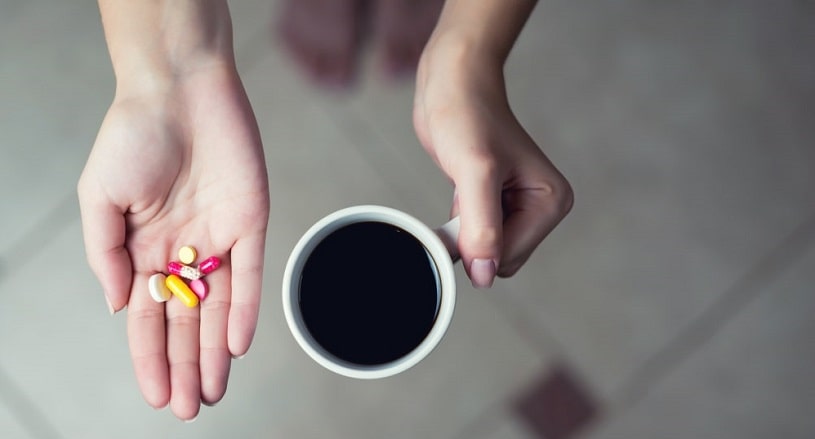
Caffeine is among the most researched food components in the US, with the vast majority of dietary contributions coming from beverage consumption. Overdoses might not happen every day, but that doesn’t mean they don’t happen at all. This article will be going over all aspects of an overdose, how it happens, symptoms, treatment, and the likelihood of death.
Table Of Contents:
How Can One Get A Caffeine Overdose?
Although a caffeine overdose is possible, it happens to be rare. What’s even rarer is someone overdosing by drinking coffee. Most of the time, the use of coffee has little to do with an overdose because it doesn’t have high enough levels to cause an overdose; it’s almost always because of a supplement.
Tablets and supplements are the sources that can cause an overdose. This is because, according to the United States Food and Drug Administration (FDA), one teaspoon of the powdered version is so concentrated that it’s almost equivalent to drinking 28 cups of coffee all at once. Therefore, this is the type of use that can cause an overdose.

In the cases where overdoses do happen, not all of them result in fatalities. The ones that do, the cause of death is almost always ventricular fibrillation. It occurs when extremely high amounts affect the heart, making the lower chambers quiver instead of beating like it usually does. The lack of beating immediately cuts off blood supply to the person’s vital organs, resulting in death. It can be amplified because of the link between caffeine and high blood pressure. It’s possible that things could progress to death even before a person has a chance to seek medical attention.
How Much Is Too Much Caffeine?
According to research, a regular cup of coffee contains approximately 75-150mg of the substance. Meanwhile, a healthy amount of daily intake is around 400mg. This is for an adult with good health, weighing roughly 70kg. That means that one can drink up to 4 cups of coffee a day. The use of coffee that way won’t cause the person to experience any significant adverse effects of caffeine.
When someone consumes it regularly, whether through coffee or tablets, they develop a tolerance, sometimes even caffeine dependence. Their bodies become used to that amount of intake, and they can end up consuming a little more than their usual and still be safe. For them, even the blood pressure increase doesn’t happen. If someone, otherwise of good health, doesn’t consume any at all, they might get some too much caffeine symptoms, even with a “safe” amount. Some might experience a significant rise in blood pressure, while for others, the symptoms wouldn’t progress to dangerous levels until an excessive amount is ingested (over 400mg).

People that are of otherwise good health can also experience a caffeine overdose. One of these cases was of a 30-year-old woman, who was otherwise of good health, had ingested 12 grams of the tablet version, ones that are readily available over the counter, and ended up experiencing a major OD. She had the amount of dosage information and had read the label. However, she got medical help and recovered to full health after 16 days of intensive care.
Symptoms of Coffee Overdose
Common caffeine overdose symptoms include heightened anxiety, irritability, restlessness or insomnia, a slight fever, dehydration, accelerated breathing, accelerated heartbeat, more energy than usual. These suggest that the amount ingested may have been too much, and though these caffeine overdose symptoms can be uncomfortable, they don’t pose a danger. The person will likely feel better as the effects subside in a few hours.
In contrast, if they’ve ingested a high very high amount, they might suffer from too much caffeine symptoms.
These Symptoms May Include:
- Shakiness
- Extreme nausea
- Very high blood pressure because of caffeine mechanism of action becoming too intense
- Confusion/ Inability to focus
- Extremely fast heartbeat
- Brain hemorrhage
If any of these symptoms are experienced, it’s advised they seek emergency medical help immediately.
Can Caffeine Poisoning Cause Death?
While death due to too much of it causing an overdose is rare, it is not unheard of. A study about caffeine-related deaths aimed at discovering the reasons beyond such fatalities. The majority of deaths were accidental from the consumption of over-the-count or dietary caffeine products.
In 2011, 12,131 people visited the emergency room because of energy drinks alone.
Beverages such as Red Bull, Cola, and Mountain Dew are popular because of the substance. Surprisingly, even chocolate milk may contain astoundingly high amounts of it. That is why people should be aware of the side effects and the possibility of overdose. Therefore, one should drink these beverages, along with coffee, in moderation.
Caffeine Overdose Treatment
The primary purpose of OD treatment here is to rid one’s body of it. At the same time, doctors will manage the symptoms. Often, they will give activated charcoal. It prevents it from entering the gastrointestinal tract. If it is already in the gastrointestinal tract, the other option might be a laxative or gastric lavage. During the treatment, doctors will constantly track the patient’s heart rate. In addition, they will also implement breathing support if needed.
In mild caffeine overdose cases, they may allow home treatments. At that time, one should consume a lot of water and foods rich in magnesium and potassium. They include bananas and greens.
If one is unsure of the severity of Caffeine Overdose, call a doctor, and seek professional advice.
Caffeine Overdose Prevention
An OD can easily be prevented if proper care is taken while consuming it.
Here Are a Few Things That Can Be Kept in Mind to Avoid an OD:
- Make sure only to consume the recommended amount, preferably stay far under it. It is especially important for people who either don’t drink it regularly or have a sensitivity.
- Read the labels of everything you consume that may have too much caffeine in it to keep track of how much of it is being consumed. Having correct ingredient information ensures there are no chances of an OD.
- Stay hydrated even if the intake is being reduced to reduce the chance of caffeine withdrawal headache.
It’s not very easy to consume a lethal dose of caffeine through something like a cup of coffee. Being reckless can easily lead to an OD. One case shows a 32-year-old man who consumed 48 cans of alcohol and caffeine mixed energy drinks and ended up having a cardiac arrest. He was in good health, but it was just too much for his system.
Staying Safe From Caffeine Overdose
Throughout this article, we have seen that unless there’s heavy supplement use, chances of an OD through regular, controlled consumption is unlikely. But also just how easy it can be to suffer from an OD if the person has not been taking care and accidentally consumes more than their body is used to, no matter how good their health is. Otherwise, caffeine poisoning or an overdose can happen. Any dose significantly higher than what the person is used to can become a lethal dose of caffeine. The only way to stay safe from an OD is to ensure that only the recommended amount is ingested. Keep in mind the built-up tolerance, or lack thereof, to ensure good health and safety of life.
Hope Without Commitment
Find the best treatment options. Call our free and confidential helpline
Most private insurances accepted
Find Drug Rehabilitation Centers Near You Anywhere In the US
Addiction Resource team has compiled an extensive list of the top drug rehabilitation facilities around the country. Use our locator tool to find the best centers near you.
Page Sources
- Jones A. W. (2017). Review of Caffeine-Related Fatalities along with Postmortem Blood Concentrations in 51 Poisoning Deaths. Journal of analytical toxicology, 41(3), 167–172. https://pubmed.ncbi.nlm.nih.gov/28334840/
- Food and Drug Administration, Pure and Highly Concentrated Caffeine, https://www.fda.gov/food/dietary-supplement-products-ingredients/pure-and-highly-concentrated-caffeine
- Murray A, Traylor J. Caffeine Toxicity. [Updated 2020 Jun 27]. In: StatPearls [Internet]. Treasure Island (FL): StatPearls Publishing; 2021, https://www.ncbi.nlm.nih.gov/books/NBK532910/
- Food and Drug Administration, Spilling the Beans: How Much Caffeine is Too Much?, https://www.fda.gov/consumers/consumer-updates/spilling-beans-how-much-caffeine-too-much
- Boulenger, J. P., Patel, J., Post, R. M., Parma, A. M., & Marangos, P. J. (1983). Chronic caffeine consumption increases the number of brain adenosine receptors. Life sciences, 32(10), 1135–1142. https://pubmed.ncbi.nlm.nih.gov/6298543/
- Mesas, A. E., Leon-Muñoz, L. M., Rodriguez-Artalejo, F., & Lopez-Garcia, E. (2011). The effect of coffee on blood pressure and cardiovascular disease in hypertensive individuals: a systematic review and meta-analysis. The American journal of clinical nutrition, 94(4), 1113–1126. https://pubmed.ncbi.nlm.nih.gov/21880846/
- Riku, S., Yamamoto, T., Kubota, Y., Ichii, T., Jinno, Y., Suzuki, S., & Murohara, T. (2018). Refractory ventricular fibrillation caused by caffeine intoxication. Journal of cardiology cases, 18(6), 210–212. https://www.ncbi.nlm.nih.gov/pmc/articles/PMC6306552/
- Osman, H., Tabatabai, S., Korashy, M., & Hussein, M. (2019). Caffeinated Energy Drink Induced Ventricular Fibrillation: The Price for Overexcitement. Cureus, 11(12), e6358. https://www.ncbi.nlm.nih.gov/pmc/articles/PMC6907723/
- Substance Abuse And Mental Health Services Administration, The DAWN Report: https://www.samhsa.gov/data/sites/default/files/spot124-energy-drinks-2014.pdf
- Cappelletti, S., Piacentino, D., Fineschi, V., Frati, P., Cipolloni, L., & Aromatario, M. (2018). Caffeine-related deaths: manner of deaths and categories at risk. Nutrients, 10(5), 611. https://www.ncbi.nlm.nih.gov/pmc/articles/PMC5986491/


 Reviewed by:
Reviewed by:  Written by:
Written by: 

 FindTreatment.gov
FindTreatment.gov